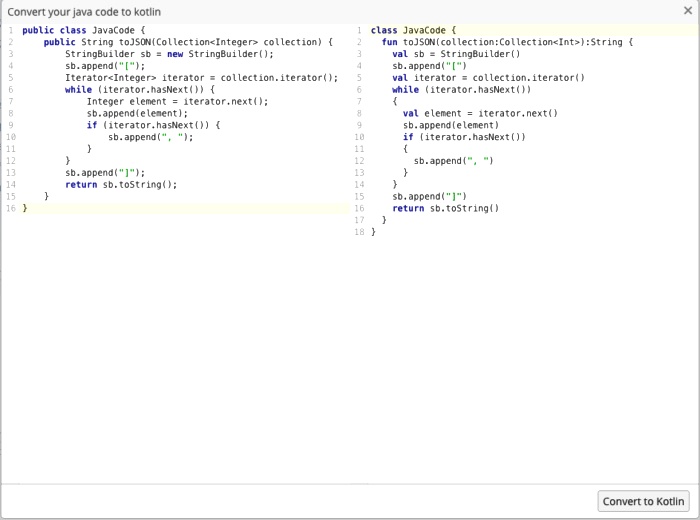Kotlin offers huge preferences over Java for JVM and Android improvement, and plays pleasantly with Java in similar undertakings. Why not try it out?
Kotlin is a broadly useful, open source, statically wrote "down to business" programming dialect for the JVM and Android that consolidates question arranged and utilitarian programming highlights. It is centered around interoperability, security, clearness, and tooling support. Adaptations of Kotlin for JavaScript (ECMAScript 5.1) and local code (utilizing LLVM) are in progress.
Kotlin started at JetBrains, the organization behind IntelliJ IDEA, in 2010, and has been open source since 2012. The Kotlin group as of now has more than 20 full-time individuals from JetBrains, and the Kotlin venture on GitHub has around 100 supporters. JetBrains utilizes Kotlin in a considerable lot of its items including its lead IntelliJ IDEA.
At first look, Kotlin resembles a streamlined form of Java. Consider the screenshot above, where I have changed over a Java code test (gave by the Kotlin people) to Kotlin consequently. Notice that the careless redundancy characteristic in instantiating Java factors has left. The Java figure of speech
in Kotlin progresses toward becoming
You can see that capacities are characterized with the fun watchword, and that semicolons are currently discretionary when newlines are available. The val watchword pronounces a read-just property or neighborhood variable. Correspondingly, the var watchword announces an alterable property or neighborhood variable.
By the by, Kotlin is specifically. The val and var catchphrases can be utilized just when the sort can be surmised. Else you have to pronounce the sort. Sort surmising is by all accounts enhancing with each arrival of Kotlin.
Observe the capacity announcement close to the highest point of the two sheets. The arrival sort in Java goes before the model, yet in Kotlin it succeeds the model, differentiated with a colon as in Pascal.
It is not evident from this case, but rather Kotlin has loose Java's necessity that capacities be class individuals. In Kotlin, capacities might be announced at top level in a record, locally inside different capacities, as a part work inside a class or question, and as an augmentation work. Augmentation capacities give the C#-like capacity to broaden a class with new usefulness without inheriting from the class or utilize any sort of configuration example, for example, Decorator.
For Groovy fans, Kotlin actualizes manufacturers; truth be told, Kotlin developers can be sort checked. Kotlin bolsters assigned properties, which can be utilized to actualize apathetic properties, detectable properties, vetoable properties, and mapped properties.
Numerous offbeat systems accessible in different dialects can be actualized as libraries utilizing Kotlin coroutines, which are test in Kotlin 1.1. This incorporates async/anticipate from C# and ECMAScript, channels and select from Go, and generators/yield from C# and Python.
Utilitarian programming in Kotlin
Permitting top-level capacities is quite recently the start of the useful programming story for Kotlin. The dialect likewise underpins higher-arrange capacities, mysterious capacities, lambdas, inline capacities, terminations, tail relapse, and generics. As it were, Kotlin has the majority of the highlights and favorable circumstances of an utilitarian dialect. For instance, consider the accompanying practical Kotlin expressions.
Separating a rundown
For a considerably shorter articulation, utilize it when there is just a solitary parameter in the lambda work:
Crossing a guide/rundown of sets
k and v can be called anything.
Utilizing ranges
The above illustrations demonstrate the for watchword and in addition the utilization of extents.
Question situated programming in Kotlin
Despite the fact that Kotlin is an undeniable practical programming dialect, it protects the vast majority of the question situated nature of Java as an option programming style, which is exceptionally convenient while changing over existing Java code. Kotlin has classes with constructors, alongside settled, inward, and unknown internal classes, and it has interfaces like Java 8. Kotlin does not have another catchphrase. To make a class occurrence, call the constructor simply like a normal capacity. We saw that in the screenshot above.
Kotlin has single legacy from a named superclass, and all Kotlin classes have a default superclass Any, which is not the same as the Java base class java.lang.Object. Any contains just three predefined part works: levels with(), hashCode(), and toString().
Kotlin classes must be set apart with the open watchword keeping in mind the end goal to enable different classes to acquire from them; Java classes are somewhat the inverse, as they are inheritable unless set apart with the last catchphrase. To supersede a superclass technique, the strategy itself must be stamped open, and the subclass technique must be checked abrogate. This is the greater part of a piece with Kotlin's theory of making things unequivocal instead of depending on defaults. In this specific case, I can see where Kotlin's method for unequivocally checking base class individuals as open for legacy and determined class individuals as supersedes keeps away from a few sorts of regular Java mistakes.
Security includes in Kotlin
Talking about dodging normal blunders, Kotlin was intended to kill the risk of invalid pointer references and streamline the treatment of invalid esteems. It does this by making an invalid unlawful for standard sorts, including nullable sorts, and actualizing alternate way documentations to deal with tests for invalid.
For instance, a normal variable of sort String can't hold invalid:
In the event that you have to permit nulls, for instance to hold SQL inquiry comes about, you can proclaim a nullable sort by annexing a question mark to the sort, e.g. String?.
The insurances go somewhat further. You can utilize a non-nullable sort with exemption, yet you need to test a nullable sort for invalid esteems previously utilizing it.
To stay away from the verbose sentence structure regularly required for invalid testing, Kotlin presents a sheltered call, composed ?.. For instance, b?.length returns b.length if b is not invalid, and invalid generally. The kind of this articulation is Int?.
At the end of the day, b?.length is an easy route for if (b != invalid) b.length else invalid. This language structure chains pleasantly, disposing of a considerable amount of prolix rationale, particularly when a question was populated from a progression of database inquiries, any of which may have fizzled. For example, bob?.department?.head?.name would restore the name of Bob's specialization head if Bob, the division, and the office head are all non-invalid.
To play out a specific operation just for non-invalid esteems, you can utilize the protected call administrator ?. together with let:
Frequently you need to restore a legitimate yet unique incentive from a nullable articulation, normally with the goal that you can spare it into a non-nullable sort. There's an extraordinary linguistic structure for this called the Elvis administrator (I kid you not), composed ?:.
is what might as well be called
In a similar vein, Kotlin does not have Java's checked exemptions, which are throwable conditions that must be gotten. For instance, the JDK signature
expects you to get IOException each time you call an affix strategy:
The planners of Java thought this was a smart thought, and it was a net win for toy programs, as long as the software engineers executed something sensible in the catch condition. Very regularly in expansive Java programs, in any case, you see code in which the required catch proviso contains only a remark:/todo: handle this. This doesn't help anybody, and looked at special cases swung to be a net misfortune for substantial projects.
Kotlin interoperability with Java
Now you might be thinking about how Kotlin handles the aftereffects of Java interoperability calls, given the distinctions in invalid taking care of and checked special cases. Kotlin quietly and dependably construes what is known as a "stage sort" that carries on precisely like a Java sort, implying that is nullable yet can produce invalid pointer special cases. Kotlin may likewise infuse an affirmation into the code at order time to abstain from setting off a real invalid pointer special case. There's no express dialect documentation for a stage sort, however in the occasion Kotlin needs to report a stage sort, for example, in a blunder message, it attaches ! to the sort.
Much of the time, calling Java code from Kotlin works the way you may anticipate. For instance, whenever both getters and setters exist in a Java class, Kotlin regards them as properties with a similar name. Thus, Boolean accessor strategies are dealt with as properties that have an indistinguishable name from the getter technique. For instance:
This plan separates for the instance of Java set-just properties, which are not yet bolstered in Kotlin. In the event that a Java class has just a setter, it won't be unmistakable as a property in Kotlin.
Kotlin's interoperability with Java stretches out to Java apparatuses. Kotlin doesn't have its own editors or IDEs; it has modules for the well known Java editors and IDEs, including IntelliJ IDEA, Android Studio, and Eclipse. Kotlin doesn't have its own particular form framework; it utilizes Gradle, Maven, and Ant.
Kotlin interoperability with JavaScript
You can utilize Kotlin to compose code for programs and Node.js. With this objective, Kotlin is transpiled to JavaScript ES5.1 as opposed to being aggregated to JVM byte code.
Since JavaScript is a dynamic dialect, Kotlin for JavaScript includes a dynamic sort not accessible in Kotlin for the JVM:
The Kotlin sort checker overlooks dynamic sorts and gives JavaScript a chance to manage them at runtime. Articulations utilizing estimations of dynamic sort are meant JavaScript as composed. Once more, Kotlin fundamentally punts and gives JavaScript a chance to decipher the articulations at runtime.
You can call JavaScript from Kotlin two ways: utilizing dynamic sorts or utilizing specifically Kotlin headers for JavaScript libraries. To get to understood, outsider JavaScript systems with a specifically API, you can change over TypeScript definitions from the DefinitelyTyped sort definitions vault to Kotlin utilizing the ts2kt device.
You can inline JavaScript code as content into your Kotlin code utilizing the js("… ") work. You can check bundle assertions in Kotlin code as unadulterated JavaScript with the outside modifier. You can call Kotlin code from JavaScript, however you have to utilize completely qualified names.
Generally speaking, Kotlin offers various favorable circumstances over Java for code to be keep running on the JVM, and can likewise produce JavaScript and local code. Contrasted with Java, Kotlin is more secure, more succinct, and more unequivocal. It bolsters practical programming notwithstanding object-situated programming, offers a cluster of valuable highlights (augmentation capacities, manufacturers, coroutines, lambdas, and so on.), and gives invalid security through nullable and non-nullable sorts. The best part is that on the off chance that you definitely know Java, you'll be gainful in Kotlin quickly.







No comments:
Post a Comment